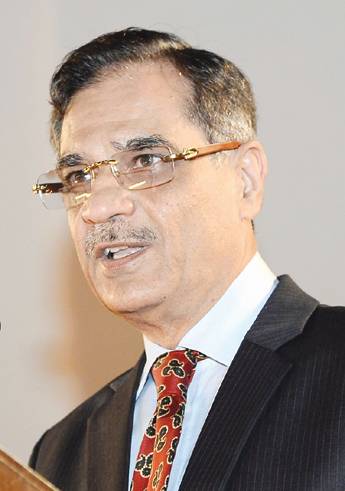LAHORE - Throwing a spanner in the rumour mill, Chief Justice of Pakistan Justice Saqib Nisar said yesterday there was no possibility of ‘martial law’ in the country from within or outside the judiciary.
Going a step further, he said he would not let democracy derail as long as he was top judge of the country. “Vote is sacred... the judiciary will not tolerate any extra-constitutional act,” he said while addressing a Pakistan Day ceremony at Cathedral School here.
Awami Muslim League (AML) chief Sheikh Rasheed had urged the chief justice the other day to impose a 90-day ‘judicial martial law’ ahead of the upcoming general elections.
Addressing a news conference in Islamabad on Wednesday, Rasheed had said that the chief justice should appointment a caretaker prime minister as the whole nation was looking towards the judiciary.
“Perhaps, the CJP should impose a 90-day-long judicial martial law in the country, but, this martial law should only last until the elections,” he said.
AML chief’s remarks met with a strong reaction from the other political parties and some opinion makers believed Rasheed might have given such a provocative statement at the asking of some quarters in the establishment.
But the chief justice said on Friday, “There’s no question of judicial martial law, the constitution does not allow any such thing.”
He said there was only one acceptable form of government and that was democracy. There was no room for dictatorship in the constitution, he added.
Justice Saqib said he and his fellow judges had taken oath under the constitution of Pakistan and they would support government which works under the injunctions of the constitution.
He also expressed the hope that the upcoming elections would be independent and the next government would be formed in accordance with the constitution.
Talking to a news channel later on Friday, Sheikh Rasheed said that instead of using the term ‘judicial martial law’ he should have used some other words to describe what he wanted to say.
He said that no political party should be given the right to pick an interim setup of their choice, as it was against the basic principles of fair play.
Chief Justice Saqib Nisar in his address said that justice was need of the hour and its dispensation should be apparent in society.
He said no one should be under the false pretension that there would be discriminatory law for the rich and the poor. He said provision of justice was necessary for nation progress and strengthening of society.
The CJP said let's pray that God bestow “us with just rulers who enjoy good reputation”. Referring to the just rule of the second caliph of Islam, Hazart Umer (RA), he said, “May Allah send Umer Khatab Sani!”
The CJP, who was accompanied by his wife and daughter during his visit to the Church, said that minorities were the soul of the judiciary and it was responsibility of judiciary to protect their rights.
He said even Quaid-i-Azam had said on numerous occasions that non-Muslim communities in Pakistan would have the same rights as the Muslim majority.
Justice Saqib said freedom was a blessing, adding we salute the towering personalities of Quaid e Azam Muhammad Ali Jinnah and Allama Dr Muhammad Iqbal whose struggle and sacrifices won us a free homeland - Pakistan.
He said subjugation and deprivation of freedom were the greatest blight, adding “we all will have to protect freedom together”. The CJP said freedom could be protected through principle and struggle and not with empty slogans.
The chief justice urged the young students to get education as all developed nations of the world achieved supremacy through the weapon of education. He said a combination of education and character-building through training ensures progress. He said the real purpose of life was serving the humanity.
FIDA HUSSNAIN






